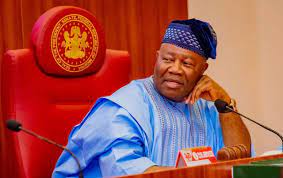On January 16, 2019, at 9pm I tuned to the NTA to watch the network news. Watching the NTA news is a practice I developed over the past 30 years. Instead of the news, however, I was confronted with a programme called ‘The Candidates’ anchored by one Kadaria Ahmed, a fellow undergraduate in the late 1980s in Bayero University, Kano. The interviewees were the presidential candidate of the APC who doubles as the incumbent president and his running mate, Vice-President Yemi Osinbajo.
Like most Nigerians, I respect and love Muhammadu Buhari not only for his character but more for his integrity, frankness and the no-nonsense approach with which he handled Nigeria as a military leader. The poor Nigerians who continuously voted for Buhari since he joined politics many years ago actually expected that kind of approach when he got to the presidency. Most of them have since been disappointed. The reasons he has always given are understandable. The platforms are different. As a military leader he could dictate a statement and ask his legal aides to turn it into a law and it was done. That is not possible in democracy. In addition, age is not on his side. He promised not to contest any election after 2011 but came back to do it in 2015, obviously due to the many politicians prodding him to do so. Most of the elected officers under APC today couldn’t have made it if not for Buhari’s popularity. That if Buhari is subtracted from APC it would be reduced to AD or at best another PDP is also not in doubt. But this is not my topic of discussion today.
I was wrong to have celebrated that interview so early. I only realised that this weekend when I logged onto YouTube and watched the interview from the beginning. A particular question was asked by a young man on the problem of almajirai and the response of the president was enough to spoil his chances at the polls if the Nigerian voters were adequately enlightened. It is also enough to be used against PMB by his opponents if we had a serious issue-based democracy.
“Your Excellency, I believe this is a major challenge for us in the Northern part of this country. Now, I am sure many don’t believe that it is something we should continue to do. So what’s your opinion on that? I think that it is important if you can do something about it. This is because you are one of those who can make difficult decisions and it can be accepted in Nigeria,” said Usman Sulaiman Jahun, a lawyer from Jigawa state.
The president replied, “I think we have to look at the three tiers of government, the federal, the state and the local governments and the allocation of resources, revenue allocation formula, and so on, relative to the resources available to the country… So the question of almajiri makes up the basic education and are all local governments’ problem. So even if the centre has extra money it wouldn’t take it and build classrooms, equip them, employ qualified teachers from the federal revenue when it is the duty of the local government….”
First, the issue of child begging is a national crisis involving millions of underaged children across the majority of the 36 states of Nigeria. I do not know of any country in the world with a crisis of such magnitude. It is thus an issue that must be addressed at the centre by the federal government. That the president would reduce it to the question of building classrooms by local governments and get applauded by an audience comprising ministers and party faithful smacks of our level of irresponsibility as a nation.
But why is the president avoiding this responsibility? Is it because the children involved are mainly Muslim children and he does not want to be accused of Islamising Nigeria? Let me remind the president that currently, federal allocation is used to run the National Hajj Commission and the Nigeria Christian Pilgrim Commission even though there are Nigerians who do not belong to either of the two main religions. Federal allocation is also used to pay salaries of religious teachers in federal government colleges and run religious studies departments in our tertiary institutions. In all these cases, no one has accused the government of religionising the country. Why then would a popular government like that of President Buhari be shy to formulate a policy that will remove millions of Nigerian children off the street for fear of being accused of Islamising the country? Is the president expecting each local government to devise its policy on Qur’anic schools? I do not expect that kind of thinking from a person of the calibre of PMB.
The president may wish to note that his predecessor built schools for the almajirai in which both Qur’anic and western education are taught and no one accused the devout Christian of Islamising Nigeria. And the Jonathan initiative was in order unless the Buhari government is saying that Qur’anic education is not a form of education.
I would like to remind Mr. President that Nigerians voted for a bold and courageous person who rose through the ranks to the highest level of his calling as a soldier. We never voted for a timid person who is afraid of confronting national issues regardless of whose ox is gored.
Professor Jibia writes from Department of Mechatronics Engineering, Bayero University, Kano.



